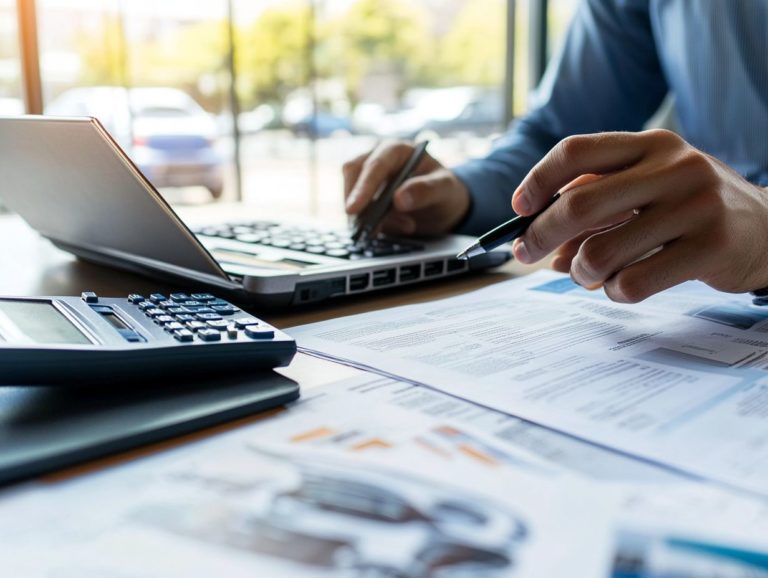5 Essential Questions to Ask When Buying
Making a purchase, whether significant or minor, can often feel like navigating a labyrinth. With a plethora of options at your fingertips, how can you be sure you’re making the right choice?
Ask yourself these key questions before you buy. This article presents five essential questions, from setting your budget and pinpointing your must-haves to grasping warranty policies and ensuring lifestyle compatibility. This guide encompasses it all.
By contemplating these key points, you’ll approach your buying decisions with assurance and clarity. These tips will help you feel confident in your buying choices! Continue reading to equip yourself with the insights necessary for your next purchase!
Contents
- Key Takeaways:
- 1. What Is My Budget?
- 2. What Are My Must-Haves?
- 3. How Long Do I Plan to Own This Item?
- 4. What Are the Warranty and Return Policies?
- 5. How Does This Item Fit into My Lifestyle?
- What Are the Different Options Available for This Item?
- Frequently Asked Questions
- What are the 5 essential questions to ask when buying a new product?
- How do I determine the purpose of the product before buying?
- What should I look for in the features and specifications of a product?
- How can I ensure I am getting the best price for the product?
- What should I know about the warranty or guarantee for the product?
- Where is the best place to purchase the product?
Key Takeaways:

- Consider your budget before making a purchase to avoid overspending and future financial stress.
- Determine your must-haves to ensure the item meets your specific needs and preferences.
- Plan for the long-term and consider how long you intend to use the item to make a practical and cost-effective decision.
1. What Is My Budget?
Understanding your budget is crucial for making smart financial choices, especially during challenging times when impulse shopping could threaten your financial well-being.
To assess your budget effectively, take a close look at your cash flow the money that comes in and goes out each month as well as your credit card usage and various expenses. This approach ensures you stay within your financial comfort zone while also planning for long-term enjoyment and security.
When calculating your budget, begin by listing all your income sources and tracking your monthly expenses. Categorize these expenses into fixed and variable costs. It s essential to differentiate between needs like housing and utilities and wants, such as dining out or subscriptions. By recognizing these distinctions, you can prioritize your spending and identify areas where you can cut back on non-essential expenditures.
A well-structured budget not only aids in managing current expenses but also plays a pivotal role in achieving your future financial goals, whether that’s saving for retirement or making a significant purchase. A solid budget helps you feel secure about your finances.
2. What Are My Must-Haves?
Identifying your must-haves is an important step in any purchasing journey, whether you re diving into home buying, indulging in some impulse shopping, or making other investments. These essentials directly shape your long-term enjoyment and satisfaction with the item or property.
By clearly distinguishing between what you truly need and what can be set aside, you can streamline your decision-making process and concentrate on what genuinely matters. For example, in real estate, a must-have might be a functional layout or a top-notch school district, while in consumer goods, traits like durability or brand reputation often rise to the top of your list.
Focusing on these crucial factors not only elevates your overall buying experience but also gives you the power to make informed decisions that align seamlessly with your individual needs. This approach ensures that your purchases lead to lasting contentment and helps you steer clear of that all-too-familiar buyer’s remorse.
3. How Long Do I Plan to Own This Item?
Considering how long you plan to own an item is essential for making informed financial decisions, especially when evaluating the true cost against long-term enjoyment and potential investment opportunities.
Take real estate, for example. If you re a homeowner looking to stay in a property for just a short period, you might discover that the costs of maintenance and repairs could overshadow any temporary benefits, ultimately diminishing its value. On the flip side, if you re a business owner making a substantial acquisition with plans to operate for many years, you can strategically manage expenses and foster asset appreciation, significantly boosting your prospects for resale.
Understanding these dynamics is crucial. Therefore, as a potential buyer, you should carefully analyze how the length of ownership impacts not only loss of value over time and maintenance but also the broader financial strategy connected to your investment.
4. What Are the Warranty and Return Policies?

Understanding warranty and return policies is vital to protect your rights and enhance your buying experience!
These policies can vary significantly. You might encounter limited warranties that cover only defects in materials and workmanship. There are also more comprehensive options that include accidental damage.
Alongside warranties, many sellers present return policies. These detail how long you have to return an item, the condition it must be in, and whether you get a refund or exchange.
Sellers are legally bound to honor these policies, and any violations can lead to serious consequences. Knowing these details can significantly impact your money situation and give you the power to make informed purchasing decisions!
Check your seller s policies today to ensure you re protected!
5. How Does This Item Fit into My Lifestyle?
Evaluating how an item fits into your lifestyle is essential for ensuring that your purchase resonates with your values and needs.
This ultimately influences your long-term satisfaction and financial comfort.
When considering lifestyle compatibility, reflect on your personal habits, such as daily routines and leisure activities. This reflection helps you gauge how new purchases will seamlessly integrate into your life.
Future plans, including career ambitions and family aspirations, are also crucial in this evaluation. Your investments today should serve your current needs and support your upcoming goals.
Don t underestimate the financial implications either! Aligning your expenditures with lifestyle choices can lead to greater satisfaction and stability.
By prioritizing these factors, you can cultivate a balanced life that brings joy and reduces stress over time.
What Are the Different Options Available for This Item?
Exploring the various options for any item, whether it s a home or a consumer product, is essential for grasping market trends.
This enhances your buying experience and ensures your purchase aligns seamlessly with your cash flow and financial aspirations.
By dedicating time to research and compare different choices, you can uncover the best deals and features the market has to offer.
Evaluating your options based on budget is crucial, as it helps define what is realistically within reach without sacrificing quality.
Quality shouldn t be overlooked! It often dictates how well a product performs over time, contributing significantly to its overall value.
Ultimately, comparing these elements gives you the power to make thoughtful decisions that cater to your immediate interests and bolster your long-term money situation.
What Are the Pros and Cons of Each Option?
Evaluating the pros and cons of each option is crucial for making sound financial decisions.
Understanding the strengths and weaknesses of your choices gives you the power to make informed and satisfying purchases.
By analyzing various factors such as cost, longevity, and potential returns, you can navigate your options more effectively.
For example, when deciding between a new car or a used one, consider the immediate financial outlay in light of the depreciation the decrease in value over time of a new model.
Investing in longer-lasting products, even with a higher upfront price tag like a reliable washing machine often yields better returns over time due to lower maintenance costs.
These thoughtful assessments influence your purchasing decisions and help align your acquisitions with your personal financial goals.
Ultimately, this ensures your investments contribute positively to your overall budget and lifestyle.
What Are the Common Features of This Item?

Identifying the common features of an item is crucial for understanding its market value and ensuring that your purchase aligns with your expectations.
Taking the time to research and compare these attributes across various brands or models can significantly elevate your decision-making process. For example, when you delve into electronics, factors such as durability, user interface, and warranty options often play a vital role in your satisfaction.
By gathering insights from reviews and product comparisons, you can pinpoint which features truly matter for your long-term enjoyment. This approach builds your confidence in your choices and helps you avoid buyer s remorse, giving you the power to invest in items that will effectively meet your needs over time.
What Are the Differences Between Brands?
It s exciting to explore how different brands stack up against each other! Brand reputation, quality, and customer service play pivotal roles in shaping the item’s market value and your overall buying experience.
As you assess various brands, dive into customer reviews. These insights often reveal aspects that marketing materials may overlook, illuminating how easy it is to use, durability, and performance over time.
Examine the warranties offered by different brands to see how much they trust their products. A brand that backs its products with robust warranties tends to foster greater trust among consumers.
Ultimately, this blend of real user feedback and dependable warranties significantly influences your long-term satisfaction and can determine whether you recommend a brand to others or decide to make a repeat purchase in the future.
What Are the Reviews and Ratings of This Item?
Investigating reviews and ratings of a product is an essential step in your buying journey. These insights into customer satisfaction can greatly influence your experience and enhance your long-term enjoyment.
By dedicating time to explore various platforms, you can uncover trustworthy reviews that illuminate both the strengths and weaknesses of the item. It s vital to maintain a balanced perspective; positive feedback often highlights features that users found impressive, while negative comments can shed light on potential issues.
This thorough approach helps you make informed decisions and sets realistic expectations for post-purchase, ultimately guiding you toward a more satisfying and well-suited choice.
What Are the Maintenance and Upkeep Requirements?
Understanding the maintenance and upkeep requirements of any item is crucial for budgeting long-term costs and ensuring that your purchase remains enjoyable and functional over time.
This means being aware of the routine care needed and recognizing potential repairs and replacements that might arise unexpectedly. It s wise to assess the specific needs of various items from vehicles and home appliances to outdoor equipment to gain a clearer picture of your annual expenses.
By incorporating these anticipated costs into your financial plan, you can avoid being caught off guard by sudden expenditures, creating a more stable financial future. Enjoy your investments seamlessly without the burden of ongoing financial strain.
Frequently Asked Questions

What are the 5 essential questions to ask when buying a new product?
The 5 essential questions to ask when buying a new product are: 1) What is the purpose of the product? 2) What are the features and specifications? 3) How much does it cost? 4) Are there any warranties or guarantees? 5) Where can I purchase it? If you’re considering a used vehicle, you should also check out these top questions to ask before buying a used car.
Now that you have the essential questions, start your buying journey with confidence!
How do I determine the purpose of the product before buying?
To determine the product’s purpose, ask yourself what problem it will solve. Will it make your life easier or more convenient?
Understanding the purpose can help you decide if the product is worth buying.
What should I look for in the features and specifications of a product?
When looking at the features and specific details, consider your needs and preferences. Will the product meet them?
Pay attention to the quality and durability, as well as any potential compatibility issues.
How can I ensure I am getting the best price for the product?
Research and compare prices from different retailers. Look for discounts, sales, or coupon codes to save money.
Consider the product’s long-term value as a higher initial cost may be worth it if it lasts longer.
What should I know about the warranty or guarantee for the product?
Warranties can save you money in the long run! Read the warranty terms carefully.
Knowing what’s covered can protect your purchase.
Where is the best place to purchase the product?
The best place to purchase depends on your preferences and needs. Consider factors such as price, convenience, and customer service.
Both online retailers and brick-and-mortar stores are options to think about.






